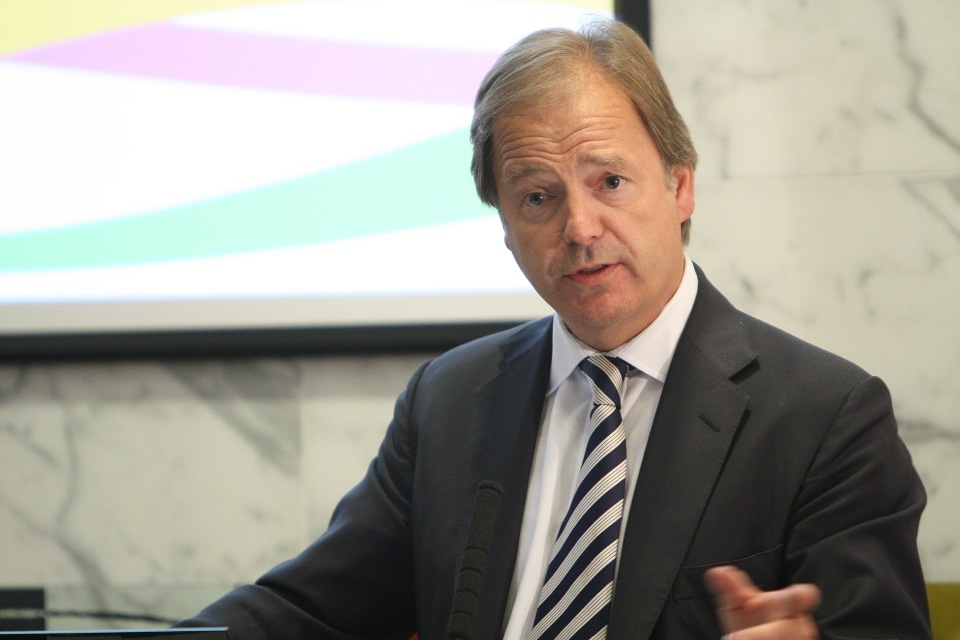Commonwealth sports meeting in Sri Lanka
Foreign Office Minister Hugo Swire spoke about the Glasgow 2014 Commonwealth Games at the Commonwealth sports meeting in Sri Lanka.

Foreign Office Minister Hugo Swire:
Your Royal Highness, Mr President, Excellencies, Ladies and Gentlemen. I thank the Commonwealth Games Federation and Sri Lankan Government for organising this event. I will not keep you too long from your breakfast.
Sport forms a part of the very identity of the Commonwealth, and the Games perhaps its most visible element. “The Friendly Games”, as they are known, will be another opportunity for some of the world’s top athletes to compete in the United Kingdom, and we intend to put on a Games in the spirit of the London Olympics.
Scotland is no stranger to major sporting events, having hosted the Games twice previously in 1970 and 1986, while its unique sporting heritage – the Highland Games – are said to have influenced the revival of the Olympics at the end of the 19th Century.
In Scotland sport is a devolved matter and I am delighted that Shona Robison, the Scottish Government’s Commonwealth Games Minister, is here with us today. I know that the Organising Committee, Glasgow City Council, the Scottish and United Kingdom Governments are all working hard to make Glasgow 2014 the best Commonwealth Games ever.
The UK as a whole will of course enter seven of the teams at the Games – England, Scotland, Wales, Northern Ireland, the Isle of Man, Jersey and Guernsey. While Scotland is the host Commonwealth Games nation.
But this morning, I want to focus on how Glasgow, like London 2012, is already looking beyond the Games. As the Chief Executive of Glasgow 2014 recently put it: “Glasgow 2014 is not a landing site, it is a launch pad”.
How it has put Legacy at the heart of its preparations. How the Games strengthen the bonds of the Commonwealth. How we can use it to bring real and lasting benefits for all Commonwealth citizens in areas as diverse as trade, youth, tourism, sporting participation, physical health and volunteering. One of the outcomes of London 2012 was how it not only brought the nation together, but how it inspired and changed attitudes on diversity, inclusion and disability. Sport has a unique power to promote the values we cherish: teamwork, fairness, respect and a sense of achievement – as well as good natured rivalry and competition!
I was delighted to be at Buckingham Palace in October, as was Shona, when Her Majesty the Queen presided over the start of the Baton Relay’s Commonwealth journey. Events like the Baton Relay – which has now reached Nauru - unite the Commonwealth family, highlight its values and culture and promote friendship. And, with our Olympics experience I am sure that the gathering of people and leaders from across the Commonwealth at the 2014 Games will strengthen, reaffirm and sustain the Commonwealth’s values.
But sport and physical activity do so much more than bring people together. They save lives and promote public health.
So, we are working hard to capitalise on public interest in sport. Following the Olympics the number of British adults cycling more than once a week rose by over 180,000. Women’s boxing saw a surge in participation thanks to the efforts of Nicola Adams as did the performances of other national heroes in the Olympics and Paralympic games. The Commonwealth Games will give renewed energy to these efforts.
Another key part of the Games legacy is prosperity. Global sporting events drive economic growth – Manchester benefited to the tune of £2.2billion in 2002, Melbourne by £1billion in 2006 and Delhi by £2.5billion.
With Glasgow 2014, and the Queen’s Baton Relay, trade will spread beyond Scotland and grow among Commonwealth countries. The Commonwealth Games Business Conference is just one example of the many opportunities to forge new links and make new contacts.
Glasgow’s people are renowned for their hospitality and generosity of spirit. The “Friendly Games” are in safe hands. As the third largest city in the United Kingdom, Glasgow will extend a warm welcome to all members of the Commonwealth family.
There’s a lot more to Glasgow than sport. Glasgow and indeed Scotland has a thriving creative and cultural scene. In addition to the 11 days of sporting competition there will be live entertainment, cultural highlights, street theatre and something happening on every corner. It will be an opportunity to visit other parts of Scotland - historic Edinburgh, the breathtaking Highlands and islands and, of course, perhaps visit some of the world famous distilleries.
I look forward to once again experiencing the ‘feel-good factor’ that people across the UK - and indeed across the world - felt during the Olympics and we intend to set a new standard, as we did with the London Olympics, for the 2018 Commonwealth Games on the Gold Coast in Australia. We are seizing the opportunity to build a lasting legacy of trade, prosperity and values with both hands. Not just for Glasgow, but for the entire Commonwealth.
Further information
Follow Hugo Swire on twitter @HugoSwire
Follow events at the Commonwealth Heads of Government on meeting on gov.uk or storify
Follow the Foreign Office on twitter @foreignoffice